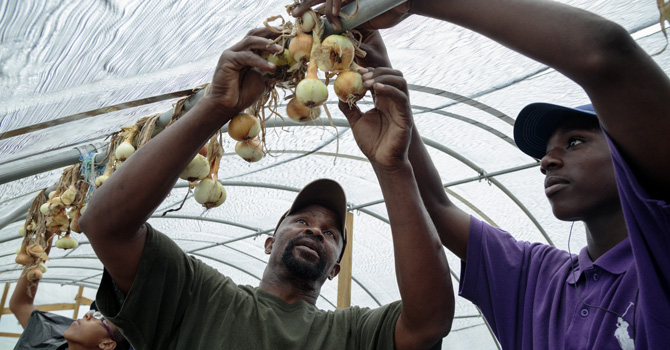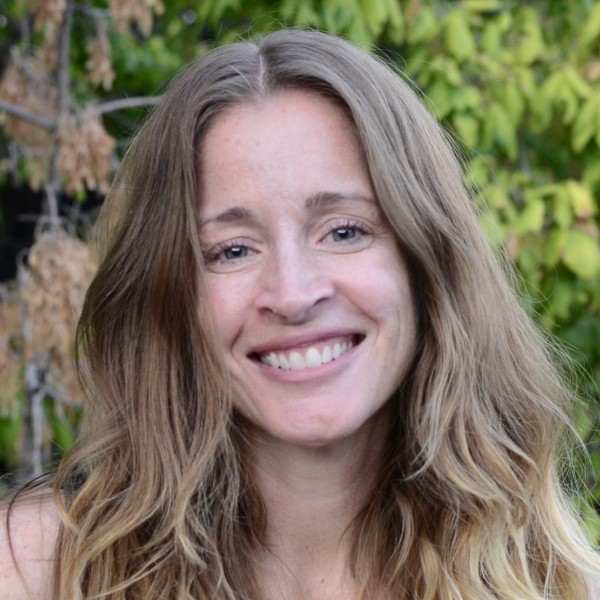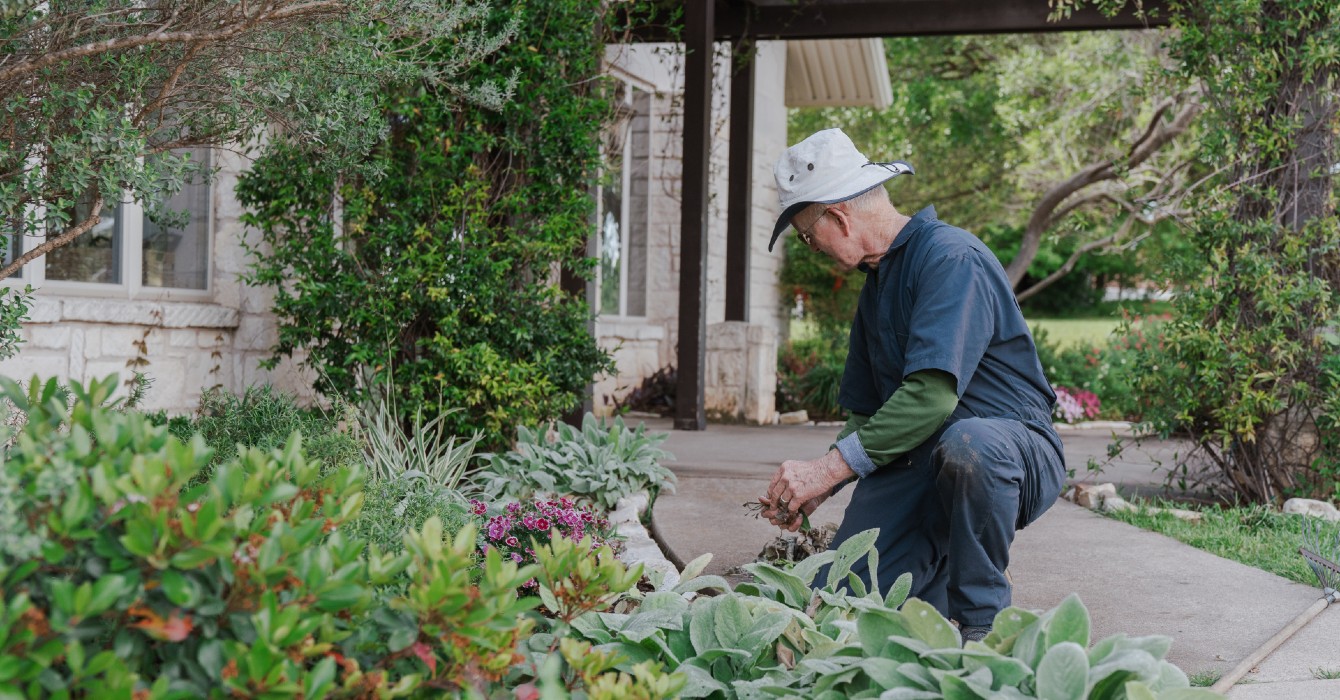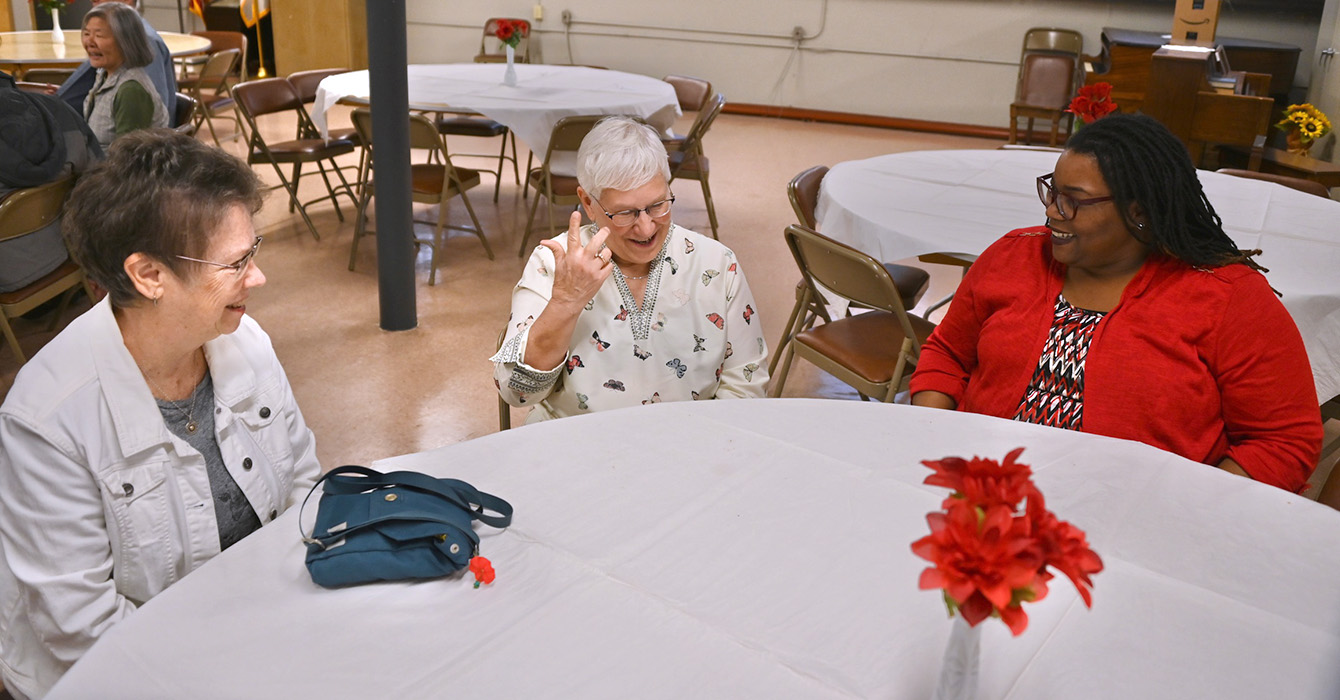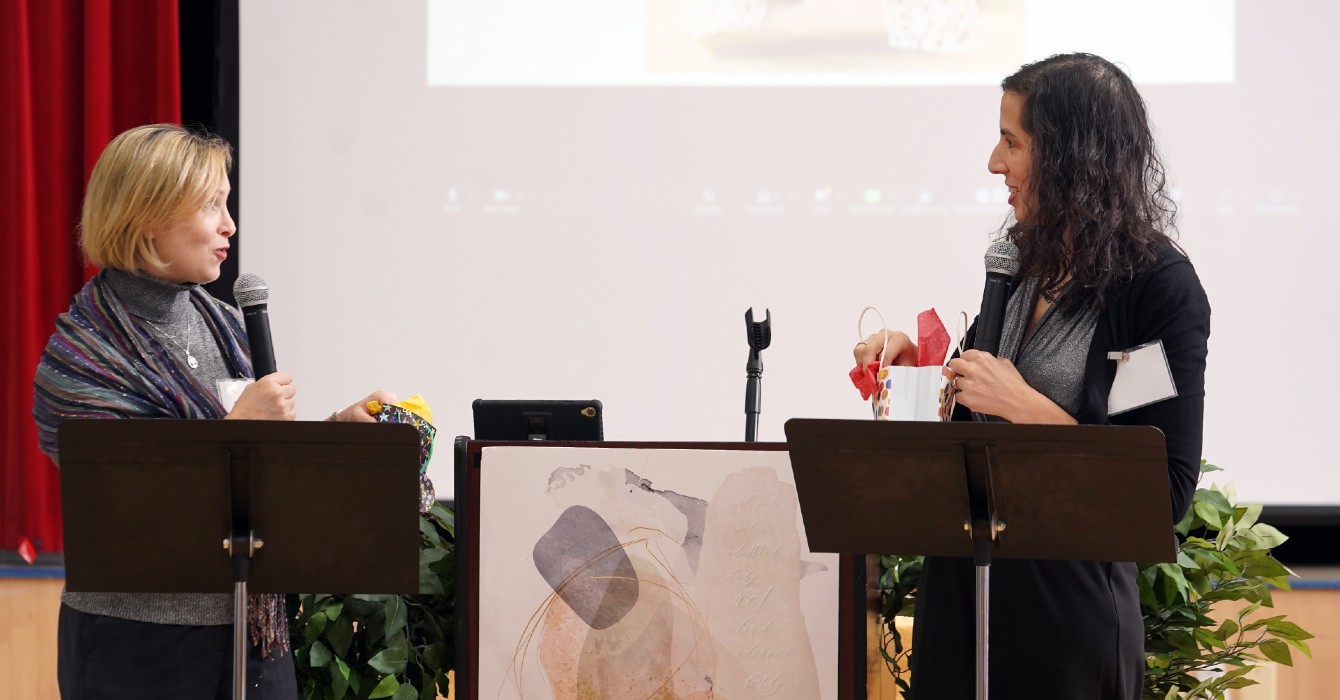The Rev. Richard Joyner prefers delivering his sermons in the garden. Dressed in jeans and boots and armed with gloves, Joyner is surrounded by rows of collards, peppers, eggplants and okra.
“This is the sermon,” he said, gesturing toward a field where youth from the impoverished rural North Carolina community of Conetoe are working, laughing and playing.
“This sermon out here -- you can experience it here. You can experience it immediately in your kitchen, and you can experience it on your table, and you can experience it in your health.
“That’s real.”
For the last decade, Joyner, the pastor of Conetoe Chapel Missionary Baptist Church, has been toiling in the field, providing a gracious bounty for his congregation and community.
 He founded the Conetoe Family Life Center, a nonprofit organization that encourages gardening, healthy eating habits and exercise for men, women and children suffering from chronic diseases and malnutrition. He’s also teaching the next generation of Conetoe residents how to feed themselves.
He founded the Conetoe Family Life Center, a nonprofit organization that encourages gardening, healthy eating habits and exercise for men, women and children suffering from chronic diseases and malnutrition. He’s also teaching the next generation of Conetoe residents how to feed themselves.
The 62-year-old Joyner had eulogized too many congregants who died from complications from diabetes, high blood pressure and other chronic ailments, he said. Many were men and women in their prime, folks in their 30s, 40s and 50s. He had watched their physical demise both as a pastor and as the director of pastoral care at a nearby hospital.
“We may not be able to afford medicine, but we can grow food,” he said. “The garden is a beautiful, spiritual sanctuary that we play in, eat in, educate in and change our lives in.”
He’s won several awards for his work, including the 2014 Purpose Prize, which recognizes social innovators older than 60.
Joyner is a scrappy preacher, willing to roll up his sleeves and help people with their immediate problems. He keeps a change of clothes in his car, prepared for whatever work that needs to be done.
“He’s sort of everywhere,” said the Rev. Allen T. Stanton, the rural church fellow at the Institute for Emerging Issues. In the late 1990s, Stanton’s father, Joe Stanton, worked with Joyner in homeless ministries in Rocky Mount, North Carolina.
“Rev. Joyner is at the hospital attending meetings, in downtown Rocky Mount working on community development -- I don’t think he understands the profoundness of what he does. I have never met someone who embodies discipleship so selflessly,” the younger Stanton said.
Joyner’s mission right now is to feed the hungry -- physically and spiritually. Conetoe (pronounced koh-NEE-tah) is a tiny community of 300 that has been designated a “food desert.” It’s about 25 miles from Rocky Mount, and 8 miles from the nearest grocery store -- a long distance, especially if you don’t have a car.
Joyner says his mandate comes from Mathew 15:32: “Then Jesus called his disciples unto him, and said, I have compassion on the multitude, because they continue with me now three days, and have nothing to eat: and I will not send them away fasting, lest they faint in the way” (KJV).
His ministry isn’t just about health; it’s also about empowerment.
In what ways is your community or organization wealthier than it thinks it is?
“Spirituality is not complete until it reaches the whole person. … I think this community is wealthier than they think they are,” he said. “We have to reframe poverty. When the system talks about poverty, they start from what you don’t have. If you start from what I don’t have, you can’t help me build on what I do have.”
Identifying abundance
Joyner has a knack for identifying abundance in every form.
He has turned a bounty of borrowed land and a mostly youthful workforce into a small farm that harvests 50,000 pounds of produce per year, as well as 5,000 pounds of honey.
Conetoe residents are welcome to carry home as many sweet potatoes, eggplants and collards as they can harvest. Meanwhile, the operation also sells to local restaurants and stores. The produce is sold in Piggly Wiggly grocery stores in Edgecombe County, where Conetoe is located, and the honey in Lowes Foods stores as far away as the Research Triangle area.
With money from foundations and in-kind donations from businesses, Joyner gets seeds, supplies and equipment for the garden. Next, he recruits youth and retirees looking for something productive to do in the small town. The pastor knows his community on a first-name basis, along with their resources and skills. The organization has grown to the point that Joyner -- who works at Nash Health Care hosital -- needed help. Garrie Moore, a former administrator at East Carolina University, now serves as the executive director.
“He uses volunteers to do everything,” said Michele Cherry, the manager of grants and special projects for Vidant Edgecombe Hospital. Cherry has worked with the Conetoe Family Life Center for the past five years through Vidant’s grant program.
“He says the magic words, ‘I really need your help. This is what I am trying to do, and I know you have the skills and the talent to help us with that.’ When he approaches you like that, it’s hard to say no.”
The project began in 2005, when Joyner found three property owners willing to let him use their land for community gardens, which range in size from a quarter of an acre to 25 acres.
The first garden was on two acres located a quarter mile from the church. It belonged to someone who’d inherited it but now lived up North, Joyner said. Instead of paying someone to mow the property, the owner turned it over to Joyner’s operation.
“I find out about opportunities, and we collaborate with each other and make it work,” Joyner said.
Persuading the congregation
It took hard work -- and not all of it in the garden. Church members initially opposed Joyner’s idea about starting a garden, Cherry said. “They are used to the pastor focusing on saving their souls, not what they are doing physically with their bodies,” she said.
Joyner had to persuade the elders of the church that their children needed to learn how to grow produce.
“He had to convince the parents and grandparents that their children needed to go and work in the fields,” Cherry said, explaining that the history of slave labor and sharecropping made many in the African-American community leery of the idea.
Joyner himself had to overcome his childhood memories of sharecropping. He grew up in Greenville, North Carolina, where his parents were sharecroppers. But he saw this as something different from the exploitative labor of the past. What he was proposing was not working for someone else. His congregation and the community would benefit by having locally grown produce to eat, he argued.
He also kept pointing out the harsh reality: “We’re not going to get a grocery store.”
To a congregation accustomed to serving up fried chicken, sugary drinks and collards cooked with ham hocks, Joyner kept emphasizing the same message after each funeral: church members needed to change their cooking practices and eating habits.
For a year, every third Sunday, a nutritionist from East Carolina University took over the pulpit and preached about eating better to change the health outcomes.
Who else besides the pastor or the leadership could be preaching a new message to your congregation, staff or organization?
“Now -- in a local Baptist church -- we do not serve fried foods as part of our dietary plan as a congregation and church,” Joyner said. “About 90 percent of the food served in our church comes from the garden.”
The children embraced the message first, and today more than 60 boys and girls of all ages plant vegetables and harvest honey.
They roam free among the rows of earth, planting and picking, running and playing and changing the trajectory of their lives. Some are motivated by personal loss.
Tationa Hyman got involved in Conetoe Family Life Center because she saw it as a way to save her 37-year-old father, who suffers from Type 2 diabetes. She especially loves working in the renovated school bus that houses the beehives.
Tobias Hopkins, 17, came to the garden for some of the same reasons. His two uncles and a cousin, at age 50 and younger, died of strokes. Joyner’s preaching has made the youth understand that these deaths might have been prevented by lifestyle changes.
“I eat all types of vegetables, including squash, cabbage and zucchini. I’ve learned how to prepare locally grown, fresh food,” Hopkins said.
He attended a summer program at the Conetoe Family Life Center, where culinary artists teach the youth how to cook flavorful food without adding fats and sodium. Throughout the church, handouts are available on topics ranging from portion size to green tea to sodium-free herbs and spices.
It’s all part of a ministry that has grown beyond a small church garden.
“He’s not just growing plants; he’s developing people,” Cherry said.
Entrepreneurship beyond the garden
Joyner has been working with youth programs for years. The Rev. Roy Gray of Cedar Hill Missionary Baptist Church in Williamston, North Carolina, has worked with Joyner for more than 25 years to give youth something productive to do.
Gray, a former Tarboro City Council member, recalls when Joyner was a Tarboro minister recruiting business owners to use their abandoned buildings for youth-run car washes.
“He keeps trying to make an impact for the youth,” Gray said.
This entrepreneurial streak has helped Joyner find and leverage partnerships all across eastern North Carolina.
“We don’t have everything we need,” Joyner said. But the blessings keep coming. “People keep telling us where more land is, where more equipment is. They keep coming out and helping us.”
Joyner is also able to capture the young people’s attention by introducing them to the world of entrepreneurship through the farm. The Conetoe children not only work in the fields; they also act as a sales force.
“All of the contracts were negotiated by the youth,” Joyner said. “They contact the store owners or managers and restock the shelves. … Kids learn how to do plant identification, soil testing. They are learning how to work together.”
For the children of Conetoe, this experience gives them a glimpse into the larger world, and exposes them to a more diverse group of people than they might otherwise meet.
“I don’t want them to be afraid of people who don’t look like them and talk like them,” Joyner said.
This work helps them develop leadership and social skills, as well as real-world experience in science, math and financial planning, he said. As they take part in running the business of the farm, Joyner hopes they’re preparing for life beyond it.
“He’s a visionary,” said Kahla Hall, the director of the Community Benefit Grants Program at Vidant Health. “He can see the big picture. As he goes along, it gets bigger for him. He gets started with one thing, and then he sees what that can lead to.”
Hopkins, a high school senior, thinks of Joyner as a father figure. “When my father stepped out, he stepped in financially and spiritually.”
Hopkins is just one of the many youth in the Conetoe community who see Joyner as someone who is willing to go to battle for them on every front.
“It’s about what he does. I’ve seen ministers say a lot of things but don’t follow up,” he said. “Rev. Joyner gets out of his suit on Sundays and gets out there in the garden and chops weeds.”
That’s his sermon -- working in the garden with a new generation of healthy, active, hardworking youth.
“You have a whole community willing to grow itself out of poverty,” Joyner said. “It really makes sense to me. I’ve been a pastor a long time, and this is as spiritual as it gets.”
Questions to consider
Questions to consider
- Joyner says the garden "is the sermon." What does that mean to you? Are there places in your ministry -- besides preaching -- that function as "the sermon"?
- In what ways is your community or organization wealthier than it thinks it is? How can your leaders and members discern where their wealth lies? How can they build on it?
- At Joyner's church, a nutritionist literally preached once a month for a year. Who else besides the pastor or the leadership could be preaching a new message to your congregation, staff or organization?
- Part of the Conetoe Family Life Center's mission is to teach young people to live healthier lives than their elders do. What investments could your organization make to improve the lives of the younger generation?
- One of the youth said he respects Joyner because he "gets out of his suit on Sundays and gets out there in the garden and chops weeds." Do you lead solely "from above?" How willing are you to be involved in the difficult, mundane day-to-day tasks of your church or organization?

